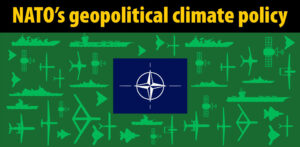NATO turns climate into a geopolitical weapon
NATO is taking another role in the global escalation of conflicts between the West and the global majority. It is not only a role in normal defence terms but a role more in general against anyone questioning the present development model. Atlantic Council which can in many ways be seen as a NATO propaganda tool has especially been attacking the cooperation in Sweden between the environmental and peace movement. It is also in Sweden NATO:s climate policy is spearheaded with the help of our Civil Contingencies Agency and the Swedish part of the transatlantic think tanks, in spite of that we are not a member country.
NATO turns climate into a geopolitical weapon
The way NATO has entered the realm of social and ecological issues is of strategic importance. NATO sees itself as the protector of multi-stakeholder models. The claim for a central role in solving the climate change issues is to define the question as a security issue. Here NATO sees its role as an essential part of the administration of the system with global ambitions. NATO wants to guarantee stable solutions by supporting Western control of new green technology and supply of natural resources at least to its membership countries and the West needed for the green transition. Domestic opposition or systemic global adversaries questioning the multistake holder model with private-public partnerships needed for the green transition envisioned by the NATO and Western powers is in this light presented as a security threat and should be treated accordingly.
What is developing is that NATO and politically close allies such as the EU are about to establish a joint geopolitical answer to the climate crisis by a comprehensive so-called rule based world order with NATO as the security arm. NATO aims at becoming a global system administrator far beyond its original defence purpose presented as defending democracy against autocratic rule.
How NATO sees its role in resolving the climate issue and “resilience” was also discussed by Anna Wieslander and others at the Brussels forum organised at NATO HQ jointly by German Marshall Fund and NATO the same year. NATO can set the standard for long-term planning and how governments, business and civil society can work together to solve the problems they concluded.At the official NATO summit the discussions in January and at the Brussels forum was turned into official less detailed NATO policy. It stated that “the Alliance has a role to play in a comprehensive response to climate change” and “NATO will strengthen exchanges with partner countries, as well as with international and regional organisations that are active on climate change and security issues, including the EU, the UN, and others, where appropriate. NATO will also increase dialogue with civil society, academia and industry on climate change and security issues, to support its work and contribute to the global response to climate change.”The official document from the NATO Summit 2021 points to the system administration ambition of NATO, other organisations are tasked with responding to the climate threat more directly, but NATO is aspiring to have a role not only in defence issues but also in the overall action. Partner countries, civil society, academic institutions and industry are among those with which NATO will strengthen its exchange on the intertwined issue of climate and security.On January 28, 2021, the Swedish Civil Contingencies Agency (MSB) and the Atlantic Council invited thought leaders and experts to a virtual roundtable, A Transatlantic Agenda for Homeland Security and Resilience Beyond COVID-19
https://www.msb.se/contentassets/08a362e199e04b67a19af68cf35e451f/a-transatlantic-agenda-for-homeland-security-and-resilience-covid-19.pdfHow NATO sees its role in resolving the climate issue and “resilience” was discussed by Anna Wieslander and others at the Brussels forum organised at NATO HQ jointly by German Marshall Fund and NATO. NATO can set the standard for long-term planning and how governments, business and civil society can work together to solve the problems: https://www.youtube.com/watch?v=GXkiD7mYG1w&t=21882s
The only evidence for how the strategy with cooperation between civil society, business and public actors can solve the climate crisis is presented in the report with a text beginning as follows:
“Case Study: How Insurance Can Rescue a Reef from Climate Impacts”
* Tord Björk has been active in the international, national and local environmental movement since the UN Conference on Human Environment in Stockholm 1972. He was a cofounder of the first broad anti nuclear power movements in Sweden 1974 and the European Youth Forest Action in the 1980s as well as the first international climate action days in 1991. Today he is a council member of International Peace Bureau and World Social Forum while still active in Friends of the Earth Sweden.








